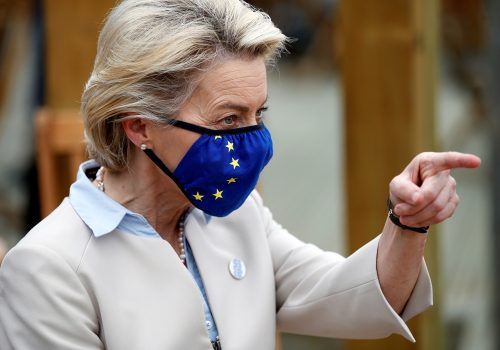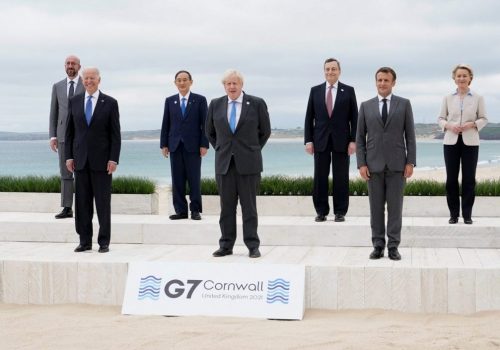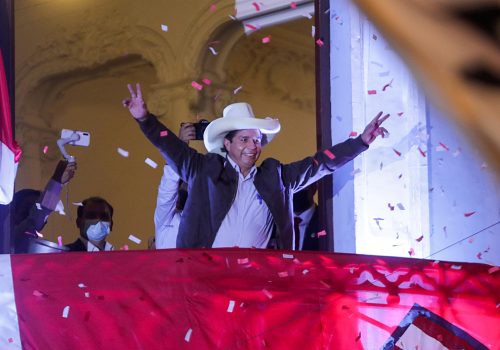Biden’s Europe trip set the stage for his historic ambitions
To comprehend the audacious ambition behind US President Joe Biden’s Europe trip last week, think of him less as commander-in-chief and more as the democratic (small “d”) world’s physician-in-charge.
Nearly eighty years ago, as far fewer democracies were under siege by surging authoritarian forces, US President Franklin Roosevelt, during a 1943 press conference, alluded to himself as “Dr. Win-the-War.” Now, as the democratic world faces a renewed assault, it’s Biden’s turn to be Dr. Save-Democracy.
Having repeatedly provided his diagnosis of the cancers endangering global democracies, Biden this past week accelerated the course of treatment. Like any good physician, he understands the cure and recovery remain uncertain after so many years of invasive and metastasizing disease.
Waiting any longer would have ensured the patient’s failure in what Biden has diagnosed as an “inflection point” in the historic and systemic struggle against authoritarianism. As he said this past week at NATO headquarters in Brussels, laying out a theme underpinning his entire presidency: “We have to prove to the world and our own people that democracy can still prevail against the challenges of our time and deliver for the needs of our people.”
Get the Inflection Points newsletter
Subscribe to Frederick Kempe’s weekly Inflection Points column, which focuses on the global challenges facing the United States and how to best address them.
Maximizing each moment
While the 78-year-old president’s messaging and his remarkable endurance on the trip’s five whistle-stops were impressive, any US leader can line up a similar set of meetings. They included his bilateral with British Prime Minister Boris Johnson, followed by the Group of Seven (G7) gathering of the world’s leading democracies, then the meeting of NATO leaders, a US-European Union (EU) summit, and finishing in Geneva with Russian President Vladimir Putin, the embodiment of what Biden is fighting.
More notable is what Biden did with them. Through painstaking planning and negotiations, his team and its partners produced dozens of pages of agreements, communiqués, and future commitments. All of it was designed to provide a narrative thread and to provoke common cause among the world’s leading democracies.
Behind all that rests an overriding Biden administration focus on China as the challenge of our time. Unlike the Trump administration, which put itself in conflict with Europe and China simultaneously, the Biden administration has gone out of its way to rally Europeans to its side in the competition with China, even if compromise is required from individual countries and an entire European Union that count China as their leading trade partner.
The agreements achieved this past week included a Carbis Bay G7 summit communiqué that contained, among much more, commitments to provide the world a further one billion doses of COVID-19 vaccines over the next year, a plan to reinvigorate member economies, and a commitment toward a global minimum tax.
They included a US-EU summit statement, perhaps the most underreported and underestimated of the week’s agreements, which established a number of dialogues that could forge closer cooperation on everything from COVID relief and climate change to technological cooperation and China.
“We intend to continue coordinating on our shared concerns, including ongoing human rights violations in Xinjiang and Tibet,” the statement said, “the erosion of autonomy and democratic processes in Hong Kong; economic coercion; disinformation campaigns; and regional security issues.”
The move to end a seventeen-year trade and tariff dispute between Boeing and Airbus also has the rising competition with China as its motivating factor. Even the three-paragraph US-Russia Presidential Joint Statement on Strategic Stability had China in its sights, aimed at launching a bilateral Strategic Stability Dialogue with the goal of creating a more predictable environment with Moscow so that Washington’s energies can be focused more squarely on Beijing.
Lurking troubles at home
Lingering beneath the surface of all Biden’s meetings, however, were enduring doubts about the durability of this renewed American commitment to alliances, democratic partners, and a common cause—producing some understandable whiplash among heads of state and government who had participated in meetings of a far different tone with former President Donald Trump.
Europeans have reason to wonder what the next US elections might bring, as Trump and his allies still refuse to accept his electoral defeat and claim fraud. They also have their own electoral uncertainties—with German elections in September set to end Chancellor Angela Merkel’s nearly sixteen years of leadership, and French President Emmanuel Macron facing local elections today that could provide a preview for his showdown next year with Marine Le Pen.
In no small part, credit those uncertainties for Biden’s large degree of success last week with his partners, who were only too eager to embrace the change. What the Trump administration demonstrated, as have the first months of the Biden presidency, is the continued dependence of global democracies upon US leadership. So why not leverage the present to put as many agreements and habits in place as possible, hoping they might be enduring.
In that spirit, the trip started appropriately with the New Atlantic Charter signed with British Prime Minister Johnson. It was a useful reminder of what a historic difference an internationally engaged United States can make, on the eightieth anniversary of the original Atlantic Charter agreed to by Roosevelt and British Prime Minister Winston Churchill.
“Our revitalized Atlantic Charter,” reads the new document, “building on the commitments and aspirations set out eighty years ago, affirms our ongoing commitment to sustaining our enduring values and defending them against new and old challenges. We commit to working closely with all partners who share our democratic values and to countering the efforts of those who seek to undermine our alliances and institutions.”
It is worth recalling that on August 14, 1941, almost four full months before the formal US entry into World War II, Roosevelt and Churchill agreed to the original charter, outlining their ambitious common aims for the postwar world and making clear US support for the British war effort.
It is also worth reflecting on what sort of world might have emerged had the United States not stepped forward.
With the postwar liberal order threatened, the New Atlantic Charter could serve as a clarion call of a renewed international commitment to the revival of democracy.
Back in December, I wrote in this space, “Joe Biden has that rarest of opportunities that history provides: the chance to be a transformative president.”
Biden’s trip to Europe recognizes and builds upon that opportunity. However, perhaps just as motivating is the understood but unspoken cost of failure at a time when the question about what global forces will shape the future is up for grabs.
This article originally appeared on CNBC.com
Frederick Kempe is president and chief executive officer of the Atlantic Council. You can follow him on Twitter @FredKempe.
THE WEEK’S TOP READS
#1 Democracy Is Surprisingly Easy to Undermine
Anne Applebaum | THE ATLANTIC
In characteristically elegant prose, Anne Applebaum at the Atlantic weaves together recent elections in Peru, Israel, and the United States to lay out a case for how those who endanger democracy copy each other’s strategies.
“Maybe we should be surprised that it hasn’t happened more often,” she writes. “Democracy has always been corruptible. Aristotle dismissed democracy because it was so likely to slide into tyranny; the Founding Fathers stuffed the Constitution with checks and balances for exactly that reason. Benjamin Franklin, when once asked what America would be, ‘a republic or a monarchy,’ responded: ‘A republic, if you can keep it.’”
Applebaum sees nothing inevitable about our recent “downward spiral” of democracies but calls upon actors across the democratic world to ensure that public servants who defend the system are protected—and that “everybody else [keeps] talking about this insidious attempt to corrode consensus before the problem engulfs our democracy and so many others.” Read More →
#2 For Biden, Europe Trip Achieved 2 Major Goals. And Then There Is Russia
David E. Sanger and Steven Erlanger | THE NEW YORK TIMES
David Sanger and Steven Erlanger, two of the smartest and most experienced chroniclers of US global leadership, provide smart analysis on Biden’s European trip.
They audit his success in the three big tasks he set out for the trip: “Convince the allies that America was back, and for good; gather them in common cause against the rising threat of China; and establish some red lines for President Vladimir V. Putin of Russia, whom he called his ‘worthy adversary.’”
Read in their piece how he largely accomplished the first (though European leaders wonder whether his presidency is an intermezzo), that he made inroads on the second, but why it is far from clear that his “modest initiatives” with Putin “will fundamentally change a bad dynamic.” Read More →
#3 America is back — and wants everyone to focus on China
Edward Luce | FINANCIAL TIMES
In the FT’s “Big Read” this weekend, Ed Luce takes an impressive swipe at how Biden’s Europe trip really was all about China.
“Biden’s game of geopolitical chess is fraught with obstacles,” he writes. “Chief among these is Europe’s reluctance to view China with the same existential concern as America does.”
This line is also worth chewing on: “Europeans listened politely to Biden’s focus on democracy versus autocracy,” Luce writes. “But their greater concern is over the future of U.S. democracy.” Read More →
#4 China Repackages Its History in Support of Xi’s National Vision
Chung Han Wong and Keith Zhai | THE WALL STREET JOURNAL
Under President Xi Jinping, the Chinese government aims to rewrite its own version of Chinese history to erase knowledge of its missteps and reinforce national identity on Xi’s terms, right down to fixing the details of how Mao Zedong’s eldest son died.
Wall Street Journal reporters Chung Han Wong and Keith Zhai look at a history academy run by Gao Xiang, a fifty-seven-year-old historian turned propaganda official, who is a key part of Xi’s “push to harness history in the run-up to the Communist Party’s 100th anniversary this summer. Those efforts have culminated in a national propaganda campaign to promote party history, launched in February, that experts describe as China’s largest mass-education drive since the Mao era.”
They write, “With China now facing such external challenges as pressure from the U.S. and questions about its handling of the Covid-19 pandemic, the campaign aims to tamp down introspection about the party’s past mistakes and portray it as an unstoppable force that has endured war and chaos to steer China’s rise.” Read More →
#5 China-US Competition: Measuring Global Influence
Jonathan D. Moyer, Collin J. Meisel, Austin S. Matthews, David K. Bohl, and Mathew J. Burrows | ATLANTIC COUNCIL AND PARDEE CENTER
Nothing could have presented a starker image of China’s rising global influence, or the urgent need for the United States to shore up its own position, than this must-read report from the Atlantic Council’s Scowcroft Center and the Frederick S. Pardee Center for International Futures at the University of Denver
Using striking visuals, the report’s authors put the abstract concept of a declining America into vivid and alarming form. Yet, as they note, “the ‘game’ is not over.” Strong multilateral alliances have long been a key tool in the development and preservation of the liberal international order, and this report makes clear how the United States can strengthen them as a means of countering China’s growing influence. Read More →
Atlantic Council top reads
Image: U.S. President Joe Biden boards Air Force One as he leaves Geneva after the US-Russia summit on June 16, 2021. Photo by Kevin Lamarque/Reuters.


